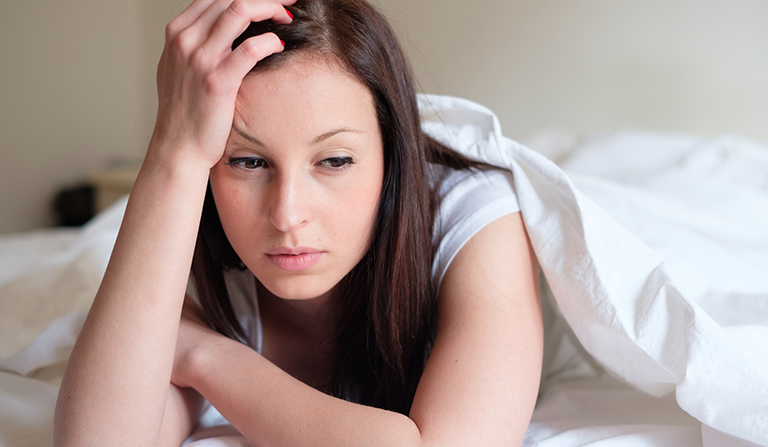
Hormones are produced in the endocrine glands. You can think of them as the body’s chemical messengers. They travel around the body and through the bloodstream telling tissues and organs what to do and when to do it. Hormonal Imbalance happens for the reason that you have too much or too little hormone in your body. Hormones help regulate metabolism, appetite, heart rate, sleep cycles, reproductive cycles, sexual function, general growth, development, mood, stress levels, and body temperature. Hormonal imbalances can affect a wide range of bodily functions. Even a little change involving hormones can have serious effects on the body.
Symptoms

People may be affected by imbalances in steroids, growth hormones, insulin and adrenaline. For women, they may experience an imbalance in progesterone and estrogen levels differing from men that may get an imbalance in testosterone levels. The symptoms of hormonal imbalance will depend on which hormones or glands aren’t functioning properly.
General Symptoms
Here are some of the symptoms associated with hormonal imbalance:
- Unexplained weight gain/loss
- Unexplained/excessive sweating
- Sleep difficulties
- Changes in heat/cold sensitivity
- Dry skin
- Skin rashes
- Changes in blood pressure
- Changes in heart rate
- Brittle/weak bones
- Changes in blood sugar concentration
- Irritability
- Anxiety
- Unexplained fatigue
- Increased thirst
- Headaches
- Depression
- Increase/decrease in bathroom activity
- Bloating
- Appetite changes
- Sex drive reduction
- Brittle, thinning hair
- Infertility
- Puffy face
- Blurred vision
- Neck bulges
- Breast tenderness
- Voice deepening in females
In Women

Women will naturally experience periods of hormonal imbalance throughout their life, such as during puberty, menstruation, pregnancy, childbirth and breastfeeding, perimenopause or menopause, and post-menopause. And since women have different endocrine organs and cycles, they have a risk of developing hormonal imbalance disorders different from men in general. These disorders may also be caused by medical conditions like polycystic ovary syndrome (PCOS), hormone replacement, early menopause, birth control medications, primary ovarian insufficiency (POI), and ovarian cancer. Here are symptoms of hormonal imbalance in women:
- Heavy/irregular/painful periods
- Osteoporosis
- Hot flashes/night sweats
- Vaginal dryness
- Breast tenderness
- Indigestion
- Constipation
- Diarrhea
- Acne during and before menstruation
- Uterine bleeding (not associated with menstruation)
- Increased hair growth on face, neck, chest or back
- Infertility
- Weight gain
- Thinning hair
- Hair loss
- Skin tags/abnormal growths
- Voice deepening
- Clitoral enlargement
In men

For men, the natural experience of hormonal imbalance occurs along with puberty and aging. Prostate cancer and hypogonadism (low testosterone) are some medical conditions that cause hormonal imbalance in men. Symptoms of hormonal imbalance in men include:
- Reduced sex drive
- Erectile dysfunction (ED)
- Low sperm count
- Reduced muscle mass
- Reduced body hair growth
- Overdevelopment of breast tissue
- Breast tenderness
- Osteoporosis
Causes
People will naturally experience hormonal imbalance or fluctuations at particular points in their life, another cause might be the endocrine glands not working properly. Endocrine glands are made up of specialized cells that produce, store, and release hormones into the body. The endocrine system includes:
- Adrenal glands
- Gonads
- Pineal gland
- Pituitary gland
- Hypothalamus gland
- Thyroid and parathyroid glands
- Pancreatic islets
There are a lot of medical conditions that can affect the endocrine glands moreover lifestyle habits and environmental factors may also be cause for hormonal imbalance. Here are some of the causes of hormonal imbalance:
- Chronic/extreme stress
- Diabetes
- Hyperglycemia (glucagon overproduction)
- Hypoglycemia (there’s more insulin produced than there is glucose in the blood)
- Hypothyroidism (underactive thyroid)
- Hyperthyroidism (overactive thyroid)
- Parathyroid hormone over/underproduction
- Poor diet and nutrition
- Being overweight
- Hormonal replacement
- Birth control medications
- Anabolic steroid medication abuse
- Solitary thyroid nodules
- Pituitary tumors
- High cortisol levels (Cushing’s syndrome)
- Low cortisol and aldosterone level (Addison’s disease)
- Benign tumors and cysts affecting endocrine glands
- Congenital adrenal hyperplasia
- Endocrine gland injury
- Severe infections or allergic reactions
- Cancers involving endocrine glands
- Chemotherapy and radiation therapy
- Goiters (iodine deficiency)
- Hereditary pancreatitis
- Turner syndrome (females with only one functioning X chromosome)
- Prader-Willi syndrome
- Anorexia
- Phytoestrogens
- Exposure to toxins, pollutants and chemicals that disrupt endocrine functions
Tests and Diagnosis
When it comes to detection, there’s no single test available for doctors to diagnose hormonal imbalance. Start by making an appointment for a physical exam. Be ready to describe your symptoms and the times they occurred. Prepare a list of all vitamins, supplements, and medications you’re currently taking. Your doctor may ask you questions such as:
- How often are you experiencing symptoms?
- Does anything help relieve your symptoms?
- Have you lost or gained weight recently?
- Are you more stressed than usual?
- When was your last period?
- Are you planning to get pregnant?
- Do you have trouble getting or maintaining an erection?
- Do you have vaginal dryness or pain during sex?
Depending on your symptoms, your doctor may suggest one or more diagnostic tests. Eventually, you can ask your doctor to perform the following test; blood testing, pelvic exam, ultrasound, biopsy, MRI, X-ray, thyroid scan and sperm count tests.
Read more 11 Best Supplements to Naturally Balance Hormones
Treatments
The treatment for hormonal imbalance may be different for each person, as it depends on what caused the imbalance in the first place.
For women:
- Hormone control or birth control – for those not trying to get pregnant, medications containing forms of estrogen and progesterone can help regulate irregular menstrual cycles and symptoms. People can take birth control medications as pills, rings, patches, shots, or an intrauterine device (IUD).
- Vaginal estrogen – people experiencing vaginal dryness associated with changes in estrogen levels can apply creams containing estrogen directly to vaginal tissues to reduce symptoms. Estrogen tablets and rings might also be used to reduce vaginal dryness.
- Hormone replacement medications – can be used to temporarily reduce severe symptoms associated with menopause, such as hot flashes or night sweats.
- Eflornithine (Vaniqa) – this prescription cream may slow excessive facial hair growth in women.
- Anti-androgen medications – medications that block the predominately male-sex hormone androgen can help limit severe acne and excessive hair growth or loss.
- Clomiphene (Clomid) and letrozole (Femara) – these medications help stimulate ovulation in people with PCOS trying to become pregnant. Those with PCOS and infertility may also be given injections of gonadotropins to help increase the chances of pregnancy.
- Assisted reproductive technology – in vitro fertilization (IVF) may be used to help those with PCOS complications get pregnant.
For men:
- Testosterone medications – gels and patches containing testosterone that can help reduce symptoms of hypogonadism and other conditions that cause low levels of testosterone such as delayed or stunted puberty.
For both:
- Metformin – medication for type 2 diabetes, it can help manage or lower blood sugar levels.
- Levothyroxine – medications containing levothyroxine, such as Synthroid and Levothroid, can help improve symptoms of hypothyroidism.
Note that lifestyle changes (for the better) may help reduce symptoms and likelihood of hormonal imbalance. Here are some, for reference:
- maintaining a healthy body weight
- eating a nutritious and balanced diet
- exercising regularly
- practicing good personal hygiene, focusing on washing areas with a lot of natural oils, such as the face, neck, back, and chest
- using over-the-counter acne washes, rinses, and medicated creams or gels for minor to moderate acne
- avoiding triggers that cause hot flashes, such as warm weather and spicy, rich, or hot foods and drinks
- reducing and managing stress
- practicing yoga, meditation, or guided visualization
- limiting sugary foods and refined carbohydrates
- avoiding packaged foods
- replacing older non-stick pans with ceramic pans
- using glass containers to store and heat foods and drinks
- restricting the use of cleaning products that contain toxic chemicals, such as bleach
- buying fruits and vegetables that have not been sprayed with pesticides or ripening chemicals
- not microwaving foods and drinks in plastics
Might also want to read: How to Start Meditating: The Ultimate Guide for Beginner’s Meditation
Comments
0 comments


Your enticle helped me a lot, is there any more related content? Thanks! https://accounts.binance.com/en/register?ref=P9L9FQKY
purple pharmacy mexico price list
https://cmqpharma.online/# mexican mail order pharmacies
mexico drug stores pharmacies
pharmacies in mexico that ship to usa: mexico pharmacy – mexican online pharmacies prescription drugs
online canadian pharmacy reviews pharmacy rx world canada canadian mail order pharmacy
https://indiapharmast.com/# mail order pharmacy india
mexico drug stores pharmacies mexican border pharmacies shipping to usa mexican mail order pharmacies
https://canadapharmast.com/# canada pharmacy online
canadian online pharmacy medication canadian pharmacy canadian pharmacy prices
https://foruspharma.com/# buying prescription drugs in mexico online
buy cipro without rx: ciprofloxacin generic – buy ciprofloxacin
order generic clomid pills: where can i get clomid no prescription – cheap clomid without prescription
paxlovid price: paxlovid pill – paxlovid pill
doxycycline over the counter south africa: doxycycline prescription cost – buy doxycycline 100 mg tablet
amoxicillin 500mg capsules price: prescription for amoxicillin – amoxicillin 500mg prescription
get cheap clomid price: how to get cheap clomid without insurance – can i buy clomid without rx
purchase cipro: buy ciprofloxacin – buy cipro online without prescription